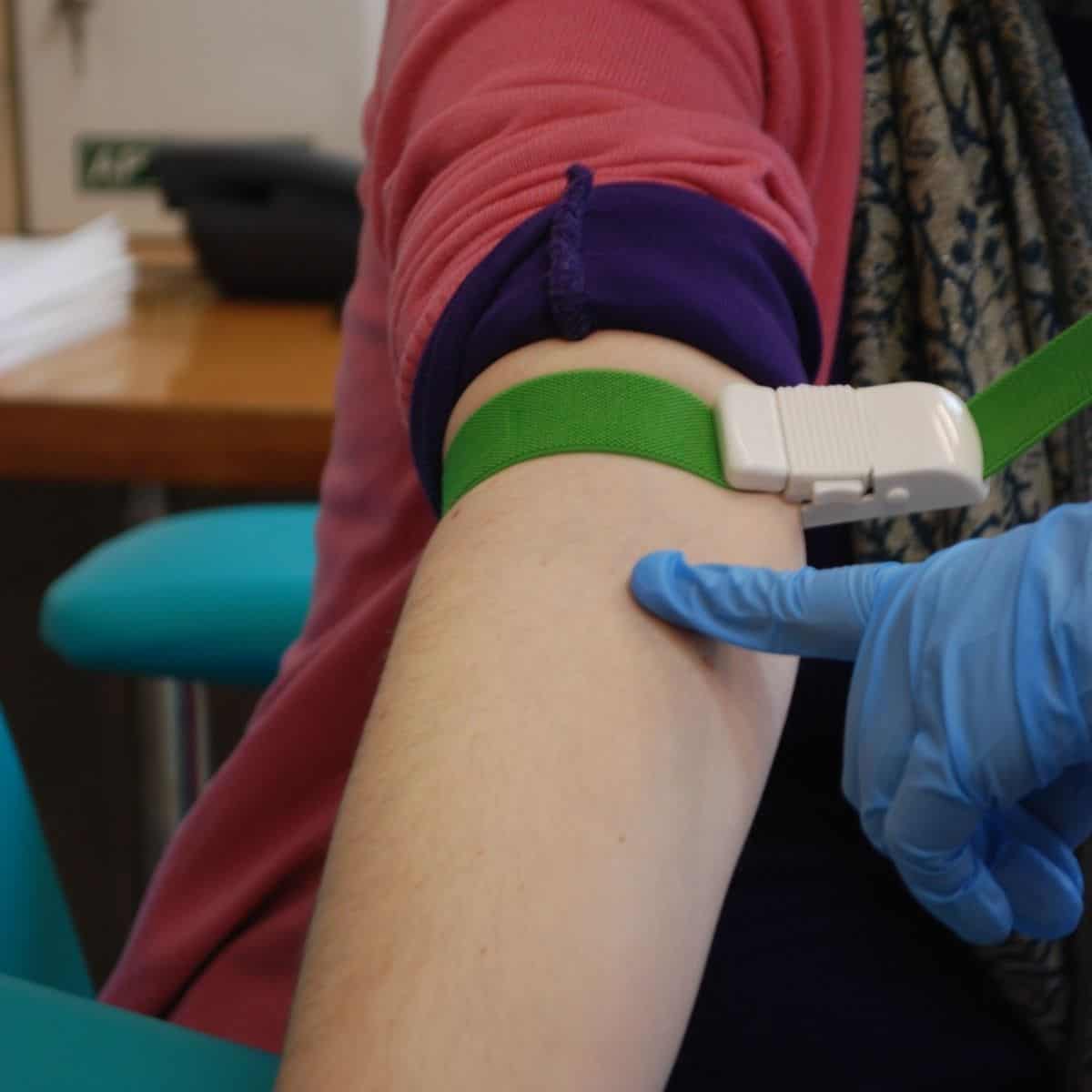Let’s be honest; infertility is a frustrating burden to bear. When you’re struggling to conceive, the idea of undergoing fertility testing can be both exciting and daunting.
In a world where half the people you know still ask, “What is infertility?” and assume it’s easy to conceive, the struggle of infertility can feel so arduous.
Thankfully, finding causes for our fertility woes is no guessing game.
From hysteroscopies to bloodwork, there are various infertility testing options available that can help doctors understand what’s going on with your haphazard reproductive system.

This site contains affiliate links, meaning that we earn a small commission for purchases made through our site. We only recommend products we personally use, love, or have thoroughly vetted.
- My Own Journey to Infertility Testing
- What Are Doctors Looking for During Infertility Testing?
- How Do You Know If Fertility Testing is Necessary?
- What Happens During Your First Infertility Workup?
- What Can Fertility Blood Tests Tell Us?
- But I’m Afraid of Needles! Help!
- Infertility Testing for Females: What Can You Expect?
- Does a Fertility Test Online Really Work?
- Getting Started with Your Infertility Workup
My Own Journey to Infertility Testing
It’s hard to recall the precise moment I realized I could be facing fertility problems.
As long as I can remember, I’ve struggled with irregular periods. For awhile, however, I didn’t think this was a problem.
It was probably around the first time I was asked THE question, that I started to wonder if my menstrual irregularity was an issue. THE question that now causes me so much stress and anxiety during doctor’s appointments:
“When was your last period?”
Now wait just a minute – how am I supposed to know? Doesn’t every girl (I was a spring chicken at the time) wait until that all-knowing headache and cramping starts to think, “Oh, I guess it must be time for my period”??
You mean to tell me, there’s actual “rhyme and reason” to the menstrual process? I was flabbergasted that my randomized cycles were apparently not the norm.
It probably would’ve been a good idea to download one of those nifty period tracking apps!
I had PCOS & Infertility
Even after learning that most women have regular period cycles month-to-month, I never pushed for better answers, and my doctors never seemed hard-pressed to find them.
Fast-forward to mine and my husband’s decision to have a baby.
I figured that this was a good time to figure out what was going on with my body. I went to my gynecologist and told her I was concerned with how my periods might affect my ability to get pregnant.
She decided a transvaginal ultrasound (more on those later) couldn’t hurt, so we gave it a go. That’s when I discovered I’d been living with Polycystic Ovary Syndrome PCOS all those years.
Ovulation predictor kits weren’t going to be enough for me. I needed much more.
This was the start of my own battle with infertility. What began as an informative ultrasound turned into a series of prodding and poking to better understand what it would take to get me pregnant.
What Are Doctors Looking for During Infertility Testing?
While the PCOS infertility rate is the primary contributing factor in 25 – 30% of infertility journeys, it’s not the only issue doctors consider when performing infertility testing for females and males.
Doctors, like primary care physicians, gynecologists, and fertility specialists, will perform a series of evaluations to look for common causes of infertility, such as:
- Low Sperm Count (a semen analysis will help look for male factor infertility)
- Poor Sperm Motility
- Anovulation (An Absence of Ovulation) or Ovulatory Dysfunction
- Premature Ovarian Failure
- Early Onset Menopause
- Blocked Fallopian Tubes
- Fallopian tubes can sometimes become blocked due to pelvic inflammatory disease, surgery for an ectopic pregnancy, or endometriosis.
- Uterine Fibroids or other anatomical issues
How Do You Know If Fertility Testing is Necessary?
Before a doctor jumps into an infertility workup, they’ll want to make sure you’ve given the “natural way” the good old college try.
If you’ve stopped using birth control and are hoping to get pregnant, it won’t necessarily happen right away.
Most doctors won’t consider starting infertility testing until you’ve been trying to conceive on your own for the following periods:
- If you’re under the age of 35, you’ll need to try for at least one year before testing
- If you’re over 35, your doctor will probably begin testing after six months
Of course, if you suspect a specific fertility issue (like PCOS), you may be able to advocate for testing sooner, at least for that specific issue.
You can also use fertility tests online to discover whether you need further infertility testing. If you do, those results from your at-home test may be used to sway your doctor into further testing or treatment.
What Happens During Your First Infertility Workup?
Questions, questions, questions – that’s what you can expect from your first infertility workup.
Questions for both the male partner and the female partner. If you’re using a sperm donor, expect tons of questions about female fertility.
Before any actual infertility testing can commence, your fertility specialist will want to have a general overview of your health history.
While there’s not typically any prep work that needs to be completed before your first appointment, you will want to know the dates of your last period, and any prior, if possible.
This is where a period or ovulation tracker app comes in handy!
Upon arriving for your appointment, your doctor will ask you a series of questions about your general lifestyle and reproductive health, such as:
- What medicines do you take?
- Do you use cigarettes, alcohol, or drugs? If yes, what kinds, and how often?
- Do you have any contact with harsh chemicals, toxins, or radiation at home or work?
- How often do you have sex?
- What’s your history with birth control?
- Do you have any STDs or problems having sex?
- Have you been pregnant before?
- Have you been experiencing irregular or missed periods?
- Do you have spotting between periods?
- Have you noticed any blood flow changes or clots?
- Have you undergone fertility testing or treatments previously?
Familiarizing yourself with these questions will help you prepare for your upcoming appointment. It’s helpful to provide your doctor with as much accurate information as possible.
After answering all of your doctor’s questions, they will likely explain the most common infertility treatments used, such as IUI or IVF.
After chatting with your doctor, the next step is likely a physical examination. Transvaginal ultrasound, PAP smear, and bloodwork are all common parts of an infertility evaluation.
Depending on the information gathered by your doctor, he or she will hopefully provide you with a tentative treatment plan before you leave the office.
If no issues appear during the physical examination, creating a plan for treating infertility may require waiting for test results from your blood tests.
What Can Fertility Blood Tests Tell Us?
If you’re gearing up for infertility treatments, there’s something you need to prepare yourself for: tons of fertility blood tests!
Bloodwork is one of the most common forms of infertility testing and can provide doctors with a wealth of information to assist them in planning your treatment cycle.
Aside from general genetic testing, there are several other types of fertility blood tests men and women will be given to evaluate various infertility-causing factors.
The bad news is that some of these tests have to be completed on a certain day of your menstrual cycle, which means you might have to wait to align your schedule with your doctor’s.
The good news is that most tests will take place all at once, so you can prepare for one stick and then lots of vials of blood.
Here are many of the hormones your doctor will check:
(1) Follicle-Stimulating Hormones (FSH)
Men and women have follicle-stimulating hormones; FSH levels play a significant role in conception.
For women, the FSH blood test will be given on the second or third day of her period. It will be used to evaluate her ovarian function and egg supply. For men, this test will determine their sperm count.
(2) Luteinizing Hormones (LH)
For women, a luteinizing hormone (LH) level test can be used in two ways. First, when given at the beginning of her period, it can show ovarian hormone imbalances from conditions, such as PCOS. If given during the middle of her cycle, it can show whether or not she’s ovulating.
LH is also responsible for stimulating testosterone production in men, which plays a role in sperm production.
(3) Estradiol
This common form of estrogen is also measured on the second or third day of a woman’s period. It helps to examine ovarian function and egg quality.
(4) Anti-Müllerian Hormone (AMH)
Anti-Mullerian Hormone (AMH) testing has become one of the most popular fertility blood tests amongst doctors. It provides an insightful look into ovarian function and egg reserves. It can also be used to determine a woman’s possible IVF success rate.
But I’m Afraid of Needles! Help!
Once upon a time, I thought I was afraid of needles. I hadn’t had much experience with them (at least none I was actually cognizant of), but the fear existed all the same.

Then I started IVF. Suffice it to say, I had to get over my so-called fear pretty dang quickly.
While some fertility clinics are experimenting with a new “needle-free” IVF treatment, the vast majority of cycles still require their fair share of injectable medications and blood tests.
Here are a few tips to help you get through the process:
- Use ice and heat to help relax or numb the area beforehand
- After the stick, massage the medications into your muscle to help them dissipate into your system and prevent soreness
- Take deep breaths before and during the injections – do not hold your breath as this will make you more likely to tense the muscle where the injection occurs, increasing soreness
- Treat yourself afterward – a nice piece of chocolate or glass of wine are ideal options, in my opinion!
Infertility Testing for Females: What Can You Expect?
Once your blood work is complete, your doctor will likely begin other types of infertility tests to learn more about your reproductive system. These include:
(1) Transvaginal Ultrasounds
We’ve mentioned these a couple other times in this piece, but now’s the time for some better information.
A transvaginal ultrasound involves, you guessed it, an ultrasound wand that is placed inside your vagina. Your feet are in stirrups just like for a pap smear, except there’s a giant wand inside of you. (It’s actually not painful; just awkward.)
This test is used to provide your doctor with an overall look at your reproductive anatomy. They are most often used to evaluate any potential problems with your ovaries or uterus.
(2) Hysterosalpingogram (HSG/Tubogram)
Most of us can’t even pronounce hysterosalpingogram, so let’s just call it an HSG.

The HSG has a reputation that precedes itself. In fact, my fertility specialist even suggested staying off the internet before my test.
Thankfully, however, it’s not as bad as the naysayers will have you believe. Seriously. It’s not.
An HSG is used to look for blocked fallopian tubes that would prevent sperm from getting to the egg, and would stop a fertilized egg from reaching your uterus for implantation.
Your doctor will insert a speculum into your vagina, just like during your PAP smear, and place a small catheter into your cervix.
A small amount of dye (less than three teaspoons) is run through the catheter into your uterus. It will fill up your uterine cavity and, if all is well, move into and through the fallopian tubes.
Your doctor will use live x-ray technology, known as fluoroscopy, to see if the dye is released from your fallopian tubes. If everything works properly, your tubes are not blocked.
While the test can cause mild cramping and discomfort, it’s not something you need to get yourself worked up about ahead of time.
Most people I talk to just remember being cold during the procedure. We do, however, recommend taking ibuprofen before to help with cramping.
(3) Saline Infusion Sonogram
A saline infusion sonogram provides doctors with a more in-depth look at your uterus and reproductive organs.
As with an HSG, a small catheter is inserted through the cervix, and your doctor will fill your uterine cavity with a sterile saline solution to help distend your uterus during an ultrasound.
This is a commonly used type of infertility testing for females during IVF cycles.
(4) Hysteroscopy
During a hysteroscopy, your doctor will use a thin, flexible tube to insert a camera through your cervix and into your uterus.
During this test, your medical team can look for any uterine problems that could be causing your infertility: fibroids, septums, scar tissue, etc.
Your fertility specialist can also collect tissue samples, if needed, during this procedure.
Depending on plans for the procedure, you may be sedated for a hysteroscopy.
If a doctor plans to just look, they’ll often perform the procedure without sedation, but if they also plan to take tissue samples or expect to remove fibroids or a septum from your uterus, expect full anesthesia.
(5) Laparoscopy
A laparoscopy is a minimally-invasive and typically outpatient surgery used to survey your entire pelvis.
The surgeon will make small cuts in your belly and insert various tools, such as a camera, to check for infertility-related problems, such as endometriosis, a painful condition where tissue grows outside of the uterus.
Does a Fertility Test Online Really Work?
Is it just me, or does there seem to be an app or online platform for just about everything these days?
This includes fertility testing.
While the idea of a fertility test online might seem quick and simple, it’s probably not going to provide the most accurate results. That is, if it’s strictly online.
There are companies that send test kits to your home and allow you to send in blood samples that are lab tested and physician-reviewed. These may provide some insight.
Here are a two recommended companies:
(1) EverlyWell
EverlyWell makes 3 at-home tests that could potentially benefit your fertility testing journey:
- Women’s Health Test This is the more comprehensive of their two tests, and it measures most of the hormones you’ll be tested for in a basic fertility workup: FSH. LH, Estradiol, Progesterone, Cortisol, and more. It does not measure your AMH, which may potentially be a really important number.
- Women’s Fertility Test: This test is middle-of-the-road in terms of being comprehensive, which is also why it comes at a lower price point than the Women’s Health Test. The Women’s Fertility Test measures FSH, LH, and Estradiol, along with the Free Testosterone and TSH hormones, so it’s still fairly comprehensive, but again, AMH is not included.
- Ovarian Reserve Test: The least comprehensive but also the lowest price point, if you just want to know if you’ve got the eggs, this may be a good test for you. It only measures your FHS levels, but it also comes at a price point that’s super reasonable.
Note that there’s no reason to take multiple of these tests. Each test builds on each other, but if you buy one of each, you’ll get many of the same results multiple times!
(2) Modern Fertility
Modern Fertility offers similar tests to Everlywell, but with one major difference: it also measures your AMH!
So it may be worth price comparing–is it cheaper to have all the bloodwork done through your doctor, or using this online service?
Get $10 off Modern Fertility by ordering through this link!
Getting Started with Your Infertility Workup
The prospect of infertility testing can seem like an overwhelming challenge, but it’s important to remember the benefits you can receive from the information.
Taking proactive measures to fight your infertility is the first step in becoming the parent you’ve been hoping to be. Just give your doctor or fertility specialist a call to start the process that could change your life.
If you’ve already gone through infertility testing, what was your experience like?










